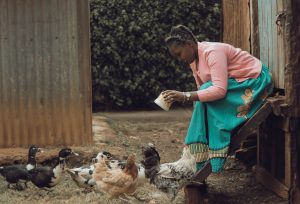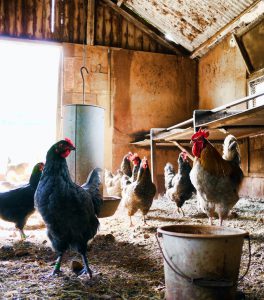The chicken has come a long way from the plains of Southeast Asia some seven to ten-thousand years ago, to a sacred animal to the Romans, and finally to household food and agricultural product in modern times. Chickens, thought to be the first animal domesticated, now are found practically everywhere. They are a great, cheap source of protein for both their meat and eggs, relatively easy to care for, and make enjoyable pets and show animals. You can even raise chickens in small backyard or urban spaces. Chickens are great for the family, and children can easily care for and raise them. Children can learn many life skills while raising a chicken, as well as many STEM competencies like vet science, anatomy, genetics, nutrition, sustainability, etc.
Because of the versatility of these animals, it is easy to see why they are increasingly popular with backyard or hobby farmers. Google trends show searches for “chick supplies”, “chicken coop”, and similar terms increased between 300% and 750% from February to May 2020! COVID-19 caused many of us to try new hobbies and to be more thoughtful about our food sources, so raising chickens may seem like an easy answer to both boredom and localizing your food. Make sure to do your homework before getting a bird or a flock. They do require work, even if they are easier than some other animals to care for. Below you will find some topics to research before making chickens a part of your life. This will help you and the chickens live happy, healthy, and productive lives!
Before purchasing chickens, you should research…
Space and equipment needed
- The size of the coop is based on a minimum of 3 square feet of floor space per bird. For backyard flocks of five birds, you will need 15sq of floor space.
-
- Coop– a house which provides shelter and protection from the elements and predators. A minimum three-sided roofed area for the birds to seek shelter from poor weather conditions and a place to roost safely at night is required.
- Run– protected open area for the birds to safely roam. The run should be securely lined with fencing which is predator proof. Examples such as chicken wire or hardwire cloth 1/2in mesh is sufficient. The run should also have either a roof or wired top, to prevent birds from flying out of the coop or predators climbing or flying inside.
- When starting your chicks from hatchlings it is important that chicks are kept in a draft free environment and provided with a heat source. The first week of life the heat source should provide a constant temperature of 95° Heat needs to be provided to the chicks until they are four weeks old. Over the four weeks the temperature can decrease by 5°F each week.
-
Backyard poultry laws for your area
- Check county and municipality laws, sometimes cities have different restrictions than the county.
-
- Laws often tell you number of chickens, coop size, licensing, vaccines, and processing regulations.
- Pinellas County Ordinance Sec. 138-3351. – Backyard chickens example: https://library.municode.com/fl/pinellas_county/codes/code_of_ordinances?nodeId=PTIIILADECO_CH138ZO_ARTIXSPUSST_DIV12ANLI_S138-3350FAAN
-
- Be a courteous neighbor by letting them know about your chickens, which can help reduce any noise or code complaints.
-
- Consider offering eggs as a peace offering (if the laws allow that).
-
- If your city or county doesn’t have laws about backyard poultry, advocate for them!
-
- Resources for this here: https://communityfoodstrategies.org/wp-
 content/uploads/2020/06/Backyard-Chickens-Advocacy-Guide.pdf
content/uploads/2020/06/Backyard-Chickens-Advocacy-Guide.pdf
-
How to choose your flock
- Before choosing a breed, determine what the purpose of the chickens will be raised for; meat, egg, pets, 4-H project, or breeding improvement. Once determined, find a breed which will suite your purpose.
-
- Environmental Conditions are important to consider because depending on where you live will determine what breed of chicken you will need for your flock. If you live in South Florida, you will want to look for a heat tolerant breed.
- Knowing your flocks’ purpose will also help determine where to purchase your bird(s).
- No matter where you purchase your chickens from local farm store, commercial breeder, backyard chicken breeder, 4-H’er, or incubate them yourself you need consider the overall health of the bird. You want to bring a healthy bird(s) into your flock.
-
Common problems
- Establish a Veterinarian who works with poultry. Just like any animal in your household, you want your chickens to also have a Veterinarian who can attend to their needs for yearly visits or in case of an emergency. Establish one before there is an emergency.
- Pests, like mites, are common in chickens. Make sure to do your homework on preventions and treatments.
- Predators like racoons, rats, coyotes, and feral cats can injure or kill your birds. Take precautions to build predator-proof housing.
- Chickens can transmit diseases to humans such as Avian Influenza (Bird Flu), E. Coli, and Salmonella. It is important for you to understand the signs and symptoms and what to look for within your flock.
- Vaccinating your flock is determined on the probability of the flock being exposed to certain diseases.
- Closed flock (no new birds enter, and no leaving birds return): Chances of exposure to a disease decrease.
- Open flock (new birds frequently come into the flock, birds are taken off the property to a show or exhibit): Probability of disease exposure increases.
- The use of your flock will determine the need for vaccines.
- UF/IFAS Extension has great resources on all of these topics here: https://edis.ifas.ufl.edu/topic_backyard_flocks
Laws and best practices surrounding eggs, meat, and food safety
- In Florida you cannot sell eggs without a Limited Egg/Poultry Permit
- Some ordinances prevent backyard chicken products from being sold, so check these too
- Research and decide how to clean and store your eggs
- If raising meat birds, verify the laws for processing your animals
Getting involved in the chicken community
- Youth: 4-H Poultry Projects, embryology, local fairs, FFA etc.
- Embryology projects are a great way to learn about the full life cycle of a chicken!
- Adults: Check out Extension poultry resources and classes in your county by reaching out to your Livestock or Agriculture Agent.
- Everyone: Join chicken groups on Facebook, review the UF/IFAS Resources https://edis.ifas.ufl.edu/topic_backyard_flocks here, and contact your local Extension office with any questions or to get involved in 4-H!
FINALLY, register for your child for our virtual summer day camp, 4-H Exploring Vet Science to learn all about various vet science topics to help you care for all your animals. More details to follow, so stay tuned! Like our Pinellas Facebook page below to stay up to date on all events, including this one.
Pinellas: www.facebook.com/Pinellas4H/
Sources
- https://www.smithsonianmag.com/history/how-the-chicken-conquered-the-world-87583657/
- https://thehustle.co/how-much-does-it-cost-to-raise-chickens-coronavirus/#:~:text=There’s%20no%20official%20count%20on,grown%20steadily%20in%20recent%20years.
- https://edis.ifas.ufl.edu/topic_backyard_flocks ,
- https://edis.ifas.ufl.edu/pdffiles/AN/AN23900.pdf ,
- https://edis.ifas.ufl.edu/pdffiles/AN/AN18200.pdf
- https://edis.ifas.ufl.edu/ps019
- https://sfyl.ifas.ufl.edu/archive/hot_topics/agriculture/poultry_vaccination.shtml
- https://sfyl.ifas.ufl.edu/find-your-local-office/
Authors: Alyssa Bowers, UF/IFAS Pinellas 4-H Agent and Tanya Binafif, UF/IFAS St. Lucie 4-H Agent
 0
0




